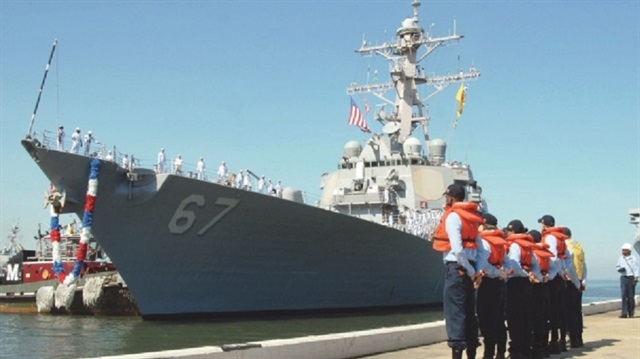
Various international actors have started to take sides in the Eastern Mediterranean, which is of critical importance because of its energy reserves worth billions of dollars. The area is also significant because it is a key route in world trade and energy traffic. The United States has accelerated its moves in the Eastern Mediterranean and Aegean region in order to curb Russia’s influence and encroach upon Turkey’s rights, which is determined to protect all its interests in the region.
A U.S. delegation led by Commerce Secretary Wilbur Ross and Undersecretary of Energy Mark Menezes took part in Greece’s Thessaloniki International Fair. Major energy deals involving Greek and U.S. interests were announced in the context of the fair on Sept. 10.

The completion of negotiations for the concession contract regarding the surveying and utilization of hydrocarbons south and southwest of Crete with the Total-ExxonMobil-Hellenic Petroleum consortium were announced in the presence of U.S. Under Secretary for Energy Mark Menezes, US Ambassador in Athens Geoffrey Pyatt and ExxonMobil representative Tristan Aspray, Greece’s Energy Minister Giorgos Stathakis.
Ross said that Greek Prime Minister Alexis Tsipras had a good relationship with U.S. President Trump.
“He (Tsipras) is as pro-American as we are pro-Greece. That’s a very important bond of friendship. He got on quite well with President Trump.”

The chairman of the U.S. Joint Chiefs of Staff made a two-day visit to Greece on Sept. 3 amid rising tensions between Washington and Turkey. Gen. Joseph Dunford met his Greek counterpart Adm. Evangelos Apostolakis in Athens and had a visit filled with high-level contacts. The trip comes as the U.S. attempts to bolster trade and military cooperation with NATO ally Greece as tension with Turkey continues to rise over a multitude of regional and political disputes.
Efforts by Southern Cyprus to grant the U.S. a base have not gone unnoticed. The base will either be located on the Karpathos or Crete islands. Washington still has three warships and a nuclear submarine in the Aegean and Eastern Mediterranean.
“It took an intensive effort by the European Commission, the United States, and a number of European countries to introduce a west-to-east reverse gas flow and thereby eliminate Russia’s ability to use its gas resources as a political weapon,” Washington’s ambassador in Athens, Geoffrey Pyatt, said on Sept. 7 at the first Oil and Gas Forum held in Greece’s Alexandroupolis.
“Of course, there is no expectation that U.S. LNG or other sources of gas can entirely supplant Russian gas. Because of obvious geographic factors, Russia will always supply a significant percentage of European gas demand. However, it should happen in a truly competitive market,” he added.
“Greece has the potential to be a crucial partner. In addition to Greece’s future role as a gas hub, Greece also holds significant upstream potential. And American companies are certainly taking notice of that,” Pyatt said.
“We are cultivating Greece as an anchor of stability in the Eastern Med. and Western Balkans; working with Cyprus as a vulnerable state that needs a greater Western attention while continuing the process towards a bizonal, bicommunal federation; and developing the energy of the Eastern Med as a major plank of European energy diversification as Europe’s traditional northern fields wind down,” said Assistant Secretary of the Bureau of European and Eurasian Affairs A. Wess Mitchell on June 7.
Rumors have also emerged that Mitchell sought to add Greece and Cyprus to the U.S.’s frontier states. It became clear that the military expansion the U.S. was engaging in to increase its reach over the energy resources of the Eastern Mediterranean and to limit Russia’s control over the Mediterranean were being done despite Turkey’s rights and interests.
“We have placed particular emphasis on bolstering the states of frontline Europe that are most susceptible to Russian geopolitical pressure,” Mitchell said last week.
The recent steps the U.S. has taken in the Aegean and Mediterranean in order to prevent Russia from controlling the Mediterranean’s south are also done to spite Turkey because Washington is weary of Ankara’s influence in the Balkans.
Washington’s activity in Greece also drew the attention of the esteemed The Wall Street Journal, which posted an article on Sept. 11 titled “U.S. Eyes Military Expansion in Greece Amid Strains With Turkey.”
“The U.S. military is in talks to expand its operations in Greece, including using more air and naval bases here, signaling a potential move toward the eastern Mediterranean amid growing tensions with Turkey,” the article by Nancy A. Youssef, a national security correspondent whose reporting has focused largely on the U.S. military and the Arab world, said.
“There are both geopolitical and geographical factors that make Greece an appealing site for the U.S. military, the officials said. Politically, U.S.-Greek relations are at an apex and both nations have concerns about their North Atlantic Treaty Organization partner, Turkey,” it added.

Turkey will not allow any unilateral hydrocarbon drilling or exploration in the Eastern Mediterranean Sea, Turkey's Energy Minister Fatih Dönmez said on Sept. 20. He said that Turkey would not allow any parties to breach Turkey's rights or those of the Turkish Republic of Northern Cyprus (TRNC) based on international law.
Turkey on many occasions has contested the Greek Cypriot administration’s unilateral drilling activity for gas in the Eastern Mediterranean, saying that Turkish Cypriots also have rights to the resources in the area.

Turkish President Recep Tayyip Erdoğan met with Greek Prime Minister Alexis Tsipras on the sidelines of the 73rd United Nations General Assembly on Sept. 25. The two leaders discussed Cyprus, migration and relations, agreeing that tensions in the region must be reduced. The developments between the U.S. and Greece were also discussed in the meeting.
















